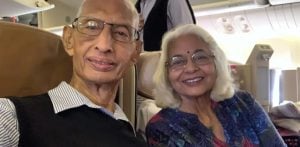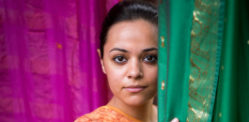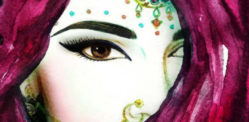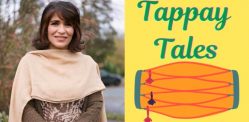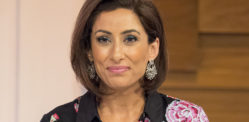“We’ve come along way in calling out obvious inequality, we need to [call out] hidden inequality"
Domestic patriarchy, honour-based violence, sexual harassment in the workplace and the gender pay gap are just four key issues that affect women from all backgrounds in the UK today.
Each of these topics formed the basis of the panel discussion organised by author and solicitor Abda Khan for International Women’s Day in Birmingham on Saturday 10th March 2018.
Abda, who is best known for her debut novel Stained, has been campaigning for many years to help raise awareness of gender-based violence and honour abuse that women face.
Through her literature, she has been able to tap into the mindsets of tight-knit Asian communities and tackle attitudes around the idea of cultural shame and izzat.
For the special Birmingham event, Abda Khan was joined by other women who are also making massive strides in narrowing gender inequality within their own communities.
Of them include 21-year old Arifa Nasim. Arifa is the founder of Educate2Eradicate, a charity that focuses on preventative measures around honour abuse, female genital mutilation (FGM) and forced marriage.
Of Iranian and Pakistani origin, Nasim was only 14 when she began campaigning against forced marriage after reading Jaswinder Sanghera’s groundbreaking book, Daughters of Shame. By rallying together her school friends, she held a Forced Marriage event at her school that raised £5,000 for charity.

From then on, her journey into activism spiralled. She explains:
“At 17, I started learning about FGM, female genital mutilation, and the fact it comes under the bracket of honour-based violence. It’s there to control female sexuality because to have them sexually promiscuous before marriage would be dishonourable.”
Her work has led her to raise awareness about issues that affect ethnic minority women in Britain on numerous platforms, including the UN. In particular, she is a strong promoter of youth engagement:
“Young people are not tokens. If it concerns young people, young people should be at the forefront of it, because we are powerful enough to do that. Nobody understands better what we go through than ourselves.”
What is interesting is that Arifa brings up the fact that many of the issues to do with FGM and honour abuse are not limited to South Asia and the East. They are very much UK issues, and therefore require UK legislation to prevent them from happening in the future.
Through her charity Educate2Eradicate, she focuses on education and delivering safeguarding training to professionals, including doctors and nurses. By working at grassroots levels, she is encouraging a wave of change through local communities and empowering young people to think for themselves along the way:
“Women’s bodies are their own. From the beginning of time, they have been controlled by men, and it’s just another form of patriarchy,” Arifa says.
Her work at local community level ties in with fellow panellist Sofia Buncy, the founder of the Muslim Women in Prison Rehabilitation Project. Sofia agrees with Arifa about how challenging it can be to transform the mindsets of community elders to encourage young girls and women realise their true potential.
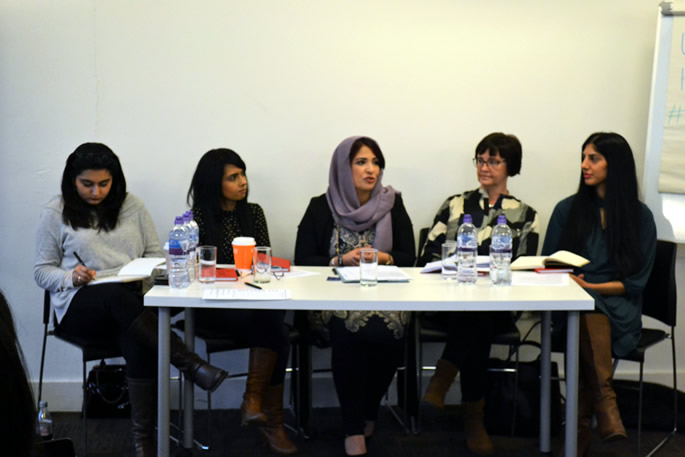
Before starting her job which aims to tackle the stigma around Asian women in the criminal system, Sofia spent time as a youth worker, encouraging South Asian parents to send their daughters to youth clubs.
By working in deprived communities across Birmingham, she was able to talk to families directly and understand some of the cultural barriers that prevent young girls from pursuing higher education.
As she explains, she found that these barriers were not necessarily instilled by mothers who were afraid to send their daughter outside the home. In fact, it was the fathers and uncles who ran the household:
“Mother’s weren’t able to make those decisions and they weren’t in a position to make those decisions. There’s this idea that women are foreign stock, they are not going to stay with their parents for long, so why would they want to invest in those women?
“That’s when I first noticed domestic patriarchy. I found that within households, decision makers are largely men, and it’s getting through them.”
Eventually, by engaging with the men Sofia was able to empower 300 girls to go into higher education and become doctors and dentists.
However, doing so came at a personal cost as she found that she had to prove her own credibility as an Asian woman before she could help others:
“You find that somehow you come into question as a practitioner, that your personal life comes into question: ‘Where are you from? Where are your parents from? Where do you live? What’s your caste system? Are you married? Are you not married?’
“You start facing these barrages of questions where you feel ‘my professionalism is being questioned, my integrity is being questioned’, and there are all these questions before you can actually get to doing your job, which I find men don’t have. They aren’t asked to fill the same credentials as we are.”
When it comes to working with Asian women in prisons, the issue of cultural shame is also apparent. As Sofia found, many of these women end up facing a double sentence. One where they are ostracised from their own communities as well, and in many cases can ‘disappear’ from society for good.
Interestingly, Sofia adds that even working in prisons has caused some controversy for her own family, as they decided to keep it a secret for as long as they could. Therefore, these patriarchal mindsets and cultural stigmas about how women should behave in public is still prevalent in Desi society.
Dr Kerry Bailey works as a partner GP in Handsworth. She admits that much of the gender inequality that she has faced in her life has been in the workplace, where the gender pay gap is still a contentious issue across all sectors.

In particular, the idea that a woman must work twice as a hard as a man to achieve the same results. Sadly, issues of gender pay gap are just the tip of the iceberg for women seeking to achieve true equality in the workplace.
Of course, this tendency for misogynistic behaviour has led to other serious issues such as sexual harassment. Dawinder Bansal, a theatre producer, spoke about some of the issues that women face in media and the creative arts, particularly as the industry tends to see an overlap between work life and social life.
Dawinder found that there were many women working in Asian media who had been victim to inappropriate behaviour or harassment from male colleagues and employers:
“I’d been on the phone with women for almost two hours, talking to me about the harassment that they’d have. And they felt they couldn’t come forward or say anything because they wouldn’t be believed.
“What was becoming clear to me was that there was an additional layer, and it all comes back to patriarchy, issues to do with Asian culture and… the repercussions if something comes out on the family, and the honour.”
Issues to do with shame and honour were recurring themes throughout the discussion. Many women begin to question their own integrity and doubt themselves. Ultimately leading them to wonder if they are at fault for facing harassment or inequality.
As the panellists note, much of this is down to how normalised gender inequality has become.
Particularly for Asian women, their first instances of gender inequality will have come from a young age. Sofia recalled how when she was younger, that the birth of boys was celebrated more than that of girls, while Dawinder noted how her aunt would give her less food than her boy cousins at meal times.
This innate feeling of inferiority, Arifa noted, is a toxic environment that needs to be overhauled:
“It’s assumed that because they are boys they can protect themselves more. From the very beginning, we are taught that the roads aren’t ours and anything that happens is our fault.”
Especially within Desi communities, much of the inequality that women do face is from other women, whether they are mothers, aunts or grandmothers.
Progress and change, therefore, can only come through knowledge and education. What each of these panellists highlighted was the need for women to support and collaborate with each other in order to overcome some of the difficulties and challenges they face. Whether this is in a work environment, or in the home.
Kerry adds: “We’ve come along way in calling out obvious inequality, I think what we need to do is sharpen out antennae to the hidden inequality.
“I really believe that we should collaborate as women, press for change, and we should call out any hidden inequality because that’s what stays there the longest. It’s what keeps us where we are.”
Education for both young men and women could be the ultimate turning point for gender inequality. As these women tell us, knowledge can welcome change and progress. And in particular knowledge of the challenges that BAME women face as well.
Representation across all sectors is essential for ethnic minority women to share their own experiences. Through highlighting cultural issues of FGM, honour abuse and gender inequality within Asian communities, perhaps one day we can finally overcome them.









